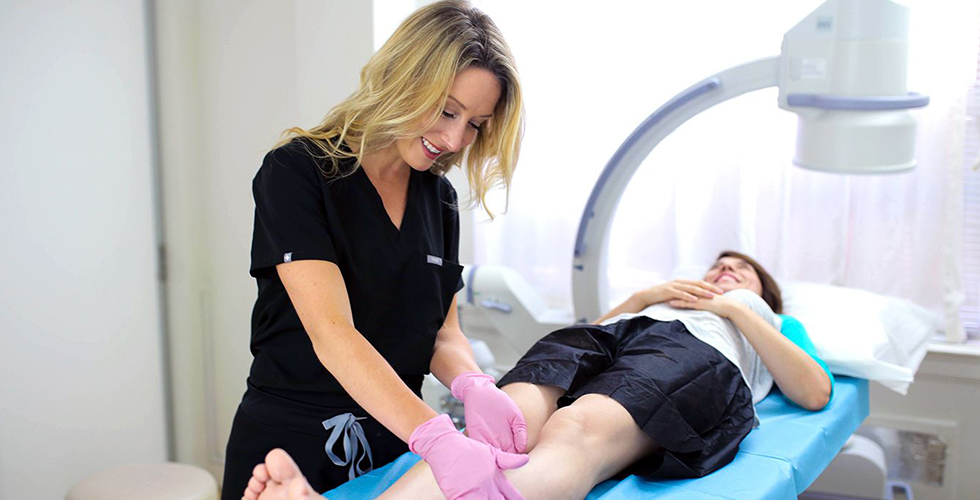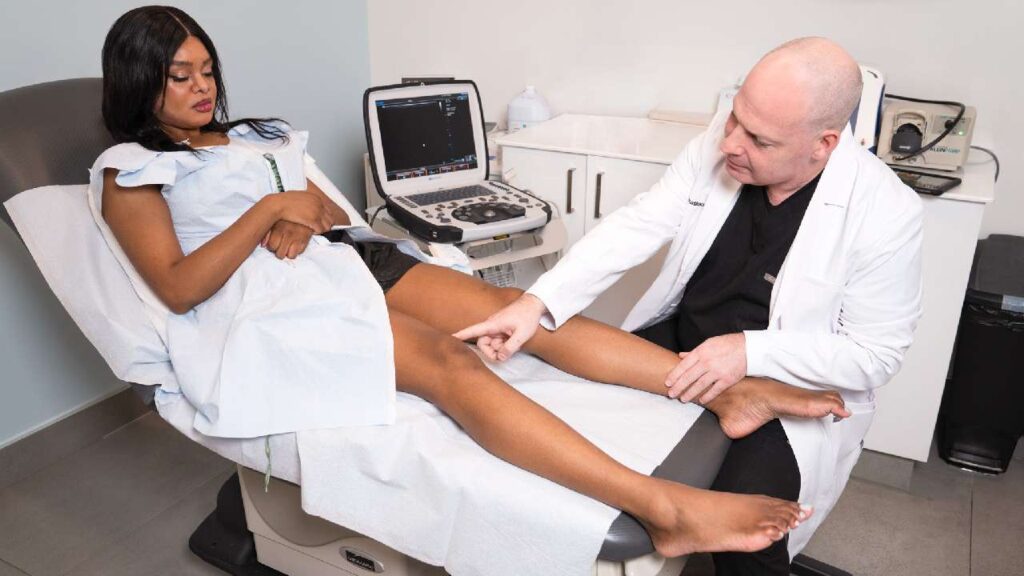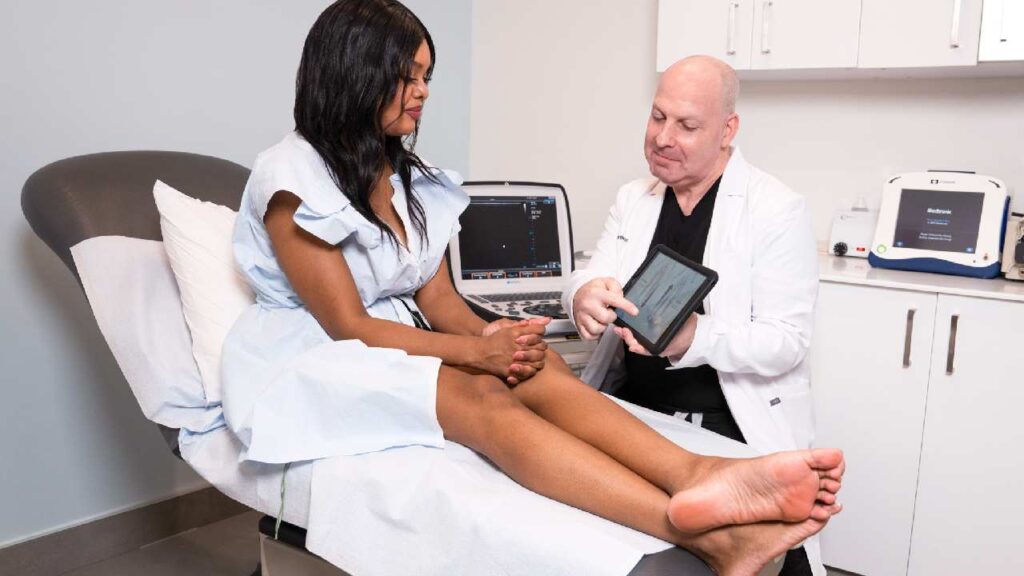Pro #1: VNUS Closure Replaces Surgery with Radiofrequency
One of the most significant advantages of VNUS Closure is that it treats spider veins and varicose veins without surgery. VNUS Medical Technologies, Inc. created this version of the FDA-approved method of closing damaged veins with radiofrequency. This closure system treats the endovascular coagulation of blood vessels caused by venous insufficiency. When a valve breaks within a vein, venous reflux occurs, which means blood begins flowing backward and collecting inside the vein. This builds excess pressure that generates the formation of spider veins and varicose veins.
VNUS closure uses an endovenous catheter and radiofrequency generator to deliver radiofrequency energy to the vein wall, causing the vein to shrink and occlude. Blood begins flowing into healthier veins, correcting the coagulation. This innovative technique treats veins inside the body, rather than surgically extracting them which is a more invasive procedure. Click HERE to visit our NY vein clinic and discuss VNUS Closure for your spider or varicose veins.

Pro #2: VNUS Closure Is Different Than VenaSeal Treatment
Since the names sound similar, some patients confuse VNUS Closure with VenaSeal Treatment. While both methods have the same goal, which is closing a malfunctioning vein, VNUS Closure uses radiofrequency (RFA) to heat and seal the vein, while VenaSeal uses cyanoacrylate glue (a medical adhesive) to seal it. Both treatment options are great solutions, however we’ve listed VNUS Closure as a “pro” specifically for patients who aren’t candidates for VenaSeal. Each method has certain advantages and disadvantages. VenaSeal doesn’t use thermal energy, so there’s no need for tumescent anesthesia to protect surrounding tissue. Since some patients are allergic to tumescent anesthesia, VenaSeal is a welcome alternative. However, the adhesive used in VenaSeal is also an allergen to some patients, and it hardens and remains in the body, which doesn’t appeal to everyone.
So if you’re researching things like, “Is VenaSeal covered by Medicare?” or “How much does VenaSeal cost?” or “What are the VenaSeal procedure steps?” or “What are the VenaSeal procedure complications?”, keep in mind that VNUS Closure and VenaSeal treatment are two different methods. Radiofrequency ablation has been around longer and is typically covered by insurance, whereas VenaSeal is newer to the market, so our insurance specialists will check your coverage. It’s important to note that neither VNUS Closure nor VenaSeal are technically surgery, so if you Google things like VenaSeal surgery, VenaSeal complications, or VenaSeal lawsuit, make sure you haven’t landed on information that applies to vein stripping surgery (phlebectomy), since there are distinct differences.
Pro #3: VNUS Closure Treats Both Spider & Varicose Veins
Another advantage to VNUS Closure is that it can treat both spider veins and varicose veins. Some treatments, like topical lasers and sclerotherapy, aren’t always successful against large varicose veins. Since many patients have both types of vein damage, radiofrequency ablation simplifies their treatment. Our NY vein doctors can treat multiple veins in a single appointment, and can also treat venous reflux with RFA, so that spider and varicose veins don’t keep developing in your legs.
Pro #4: VNUS RFA Also Corrects Venous Insufficiency & Pain
Spider or varicose vein treatment is only successful long-term if the cause is identified and addressed. Millions of patients with varicose or spider veins have a condition called Chronic Venous Insufficiency. This causes venous valves to collapse and blood to pool in the vein. If you simply treat the surface vein, and not the deeper vein causing the build-up, additional spider veins or varicose veins will appear. Patients who aren’t satisfied with a sclerotherapy or laser treatment likely saw a vein specialist who didn’t check for this underlying disease. Since the VNUS Closure system seals off the problematic vein completely, blood no longer flows through the faulty valve, so those unsightly veins stop appearing. In addition, radiofrequency can be used for chronic pain, by heating the irritated nerve. Pros and cons of nerve burning are similar to vein ablation, so talk to our doctors if you have pain along with vein damage.
Pro #5: VNUS Reduces Risk of Blood Clot After Vein Ablation
Treating unhealthy veins greatly reduces the risk of life-threatening complications that stem from undetected blood clots and vein disease. Our NY vein treatment clinic uses Doppler Ultrasound to view the map of your veins, identifying problematic areas and blood clots at risk of becoming a pulmonary embolism. The visual appearance of spider veins and varicose veins is only one of the issues. Symptoms like swelling, cramping, itching, heaviness, and restlessness are common with damaged veins. In addition, more severe problems like venous ulcerations, bleeding that’s hard to control, and blood clotting issues are serious risks of ignoring defective veins. Treating veins with VNUS Closure, ClariVein, Varithena, or VenaSeal poses less risk of developing new blood clots following treatment than with vein stripping surgery.
Pro #6: RFA Is Commonly Covered by Insurance & Medicare
One thing that pleases our patients the most is that RFA (VNUS Closure, ClosureFast, etc.) is commonly covered by insurance, including Medicare. This is a time-tested treatment with high success rates and low risk profiles, making it a top choice for patients, vein doctors, and insurance providers. Patients who feel their vein issues are merely cosmetic are relieved to know that treatment is affordable, often requiring no out-of-pocket payment. And patients who suffer more serious symptoms of vein disease are relieved to know that resolving them won’t cost a fortune.
Con #1: Some Patients Don’t Tolerate the Anesthetic
There are far more advantages than disadvantages to radiofrequency ablation, and it’s one of our most recommended procedures for its remarkable safety, simplicity, and success. However, no medical procedure is 100% risk-free, nor is it right for everyone. Some patients have an allergy or sensitivity to the tumescent anesthesia used in VNUS Closure. Since RFA uses thermal energy, it’s important to protect the tissue surrounding the treated vein. If patients can’t tolerate the anesthetic, another procedure like VenaSeal treatment, ClariVein or sclerotherapy will be advised.
Con #2: Complications, Side Effects Possible Without Training
Another potential disadvantage of VNUS Closure is that administering RFA requires great precision. This means you need a doctor who’s highly trained and has significant experience with the procedure. An unqualified vein specialist poses risks to you, like bleeding or infection, as well as heightened side effects of pain and swelling. To make sure your vein treatment is a pleasant success, choose our highly trained NY vein doctors for your care. Our award-winning vein clinic offers everything you need for an excellent outcome!





